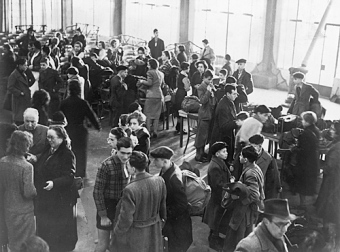Norbert Wollheims Beteiligung an der Organisation der Kindertransporte

© bpk, Berlin
(Norbert Wollheim, First Interview [Eng.], 10.5.1991. United States Holocaust Memorial Museum, Transkript, S. 35–36 [sprachlich bereinigt].)
(Norbert Wollheim, First Interview [Eng.], 10.5.1991. United States Holocaust Memorial Museum, Transkript, S. 44–45 [sprachlich bereinigt].)
(Norbert Wollheim, First Interview [Eng.], 10.5.1991. United States Holocaust Memorial Museum, Transkript, S. 41–43 [sprachlich bereinigt].)
(Norbert Wollheim, Interview mit Nikolaus Creutzfeldt [Eng.], New York 1986–88 (Heinlyn Productions; produziert von Leslie C. Wolf). Archiv des Fritz Bauer Instituts, Transkript, S. 73–74.)
(Norbert Wollheim, First Interview [Eng.], 10.5.1991. United States Holocaust Memorial Museum, Transkript, S. 49 [sprachlich bereinigt].)
In Berlin war Norbert Wollheim Zeuge des Pogroms vom 9./10. November 1938 geworden und unterstützte in den folgenden Wochen jüdische Männer, die an diesen Tagen von der Gestapo ins KZ Sachsenhausen verschleppt worden waren. Sie wurden nun wieder entlassen, waren jedoch häufig verletzt, misshandelt und krank, und versuchten, zu ihren Familien zurückzukehren. „Damals begriff ich, dass Rabbiner Leo Baeck, der mein Lehrer und geistiger Mentor war, Recht hatte, als er sagte, dass die historische Stunde des deutschen Judentums zu einem Ende gekommen sei.“[1]
In seinen Vorbereitungen zur eigenen Auswanderung wurde Norbert Wollheim von Otto Hirsch von der Reichsvereinigung der deutschen Juden unterbrochen, der ihn bat, die Organisation der Auswanderung tausender Kinder[2] zu übernehmen, deren Aufnahme Großbritannien in Folge des Pogroms angeboten hatte.
Nachdem eine hochrangige Delegation britischer Juden, unter ihnen Viscount Samuel, Lord Bearsted, der Oberrabbiner J. H. Hertz und Chaim Weizmann, vom britischen Premierminister Neville Chamberlain die Zusage für die Aufnahme der Kinder erhalten hatten, standen sowohl in England als auch in Deutschland die involvierten Wohltätigkeitsorganisationen und Helfer/innen vor zahlreichen organisatorischen Problemen. In England sammelte das Refugee Children’s Movement Spenden zur Finanzierung des ganzen Unternehmens und machte sich auf die Suche nach Pflegefamilien, seien sie jüdisch oder christlich. Gerade Pflegefamilien zu finden, erwies sich als schwierig, so dass viele Kinder nach ihrer Ankunft in England erst einige Zeit in dem für sie geschaffenen Auffanglager in Dovercourt untergebracht werden mussten.
In Deutschland war die Aufgabe zunächst, in ganz Deutschland jüdische Kinder zu finden, die die Kriterien erfüllten – unter 17 Jahre, gesund, mit Einverständnis der Eltern, da diese ja nicht mitgehen durften –, für sie die Ausreiseformalitäten zu regeln und festzulegen, wann sie von Berlin nach England reisen sollten. Während Wohltätigkeitsorganisationen in den jüdischen Gemeinden vor Ort die Kinder aussuchten und ihre Unterlagen nach Berlin schickten, war es Norbert Wollheims Aufgabe, die Listen der einzelnen Transporte zusammenzustellen und sie mit den Organisationen in England abzustimmen, was häufig nächtlicher Telefongespräche bedurfte, auf die er manchmal mehrere Stunden warten musste wegen der schlechten Verbindungen.
Die Kinder mussten sich einem Gesundheitscheck unterziehen und wurden daraufhin in den örtlichen jüdischen Gemeinden für einen der Kindertransporte ausgewählt oder abgelehnt. Es wurde auf diese Weise auch versucht, Jungen außer Landes zu bringen, die am 9./10. November von der Gestapo verhaftet worden waren und nur mit der Auflage wieder entlassen worden waren, das Deutsche Reich bald zu verlassen. Die Eltern brachten ihre Kinder aus ganz Deutschland nach Berlin,[4] von wo sie in besonderen Waggons abfuhren. Norbert Wollheim hatte mit Kindern und Eltern erst in Berlin bei der Verabschiedung am Bahnhof direkt zu tun. Hierfür mietete er im Schlesischen Bahnhof einen separaten Saal an, da die Gestapo den Eltern verboten hatte, ihre Kinder auf den Bahnsteig zu begleiten, um öffentlich sichtbare Abschiedsszenen zu vermeiden. In diesem Saal war es seine Aufgabe, mit einer kurzen Ansprache den endgültigen Abschied zwischen Eltern und Kindern einzuleiten.
Weitere Helfer/innen wurden rekrutiert, um die Kinder zu begleiten, zunächst nur bis zur holländischen Grenze, aber bald gelang es, die deutschen Behörden davon zu überzeugen, dass es im Interesse aller sei, die Kinder bis nach London zu begleiten. Dies gestattete die Gestapo nur unter der Bedingung, dass alle Begleiter/innen sofort aus England nach Deutschland zurückkehren mussten; hätte eine/r die Reise nach England zur Flucht aus dem Deutschen Reich genutzt, wären die Kindertransporte von der deutschen Seite abgebrochen worden. Es lag also bei der Auswahl der Begleiter/innen eine große Verantwortung auf Norbert Wollheim. Er begleitete selbst vier oder fünf der etwa 20 Kindertransporte von Berlin nach England, auch einige nach Schweden, denn auch Schweden entschloss sich, jüdische Kinder aus Deutschland aufzunehmen. Die Reisen nach England nutzte Wollheim zudem für organisatorische Absprachen mit den Mitarbeiter/innen des Refugee Children’s Movement dort.
Die Züge fuhren von Berlin zur holländischen Grenze, wo sie noch einmal den Schikanen der SS ausgesetzt waren, die häufig alles Gepäck der Kinder durchwühlten und diese terrorisierten.
Im Sommer 1939 hatte das Refugee Children’s Movement zunehmend Schwierigkeiten mit der Finanzierung der Transporte, im August ging das Geld ganz aus. Mit dem Einmarsch der deutschen Wehrmacht in Polen endete im September 1939 jede Möglichkeit, weitere Kinder außer Landes zu bringen. Bis zu diesem Zeitpunkt war es nach Norbert Wollheims Aussage gelungen, etwa 6–7.000 Kinder aus Deutschland nach England und Schweden zu bringen.
Ein letzter Kindertransport, der eigentlich für Anfang September vorgesehen war, hatte noch in den letzten Augusttagen nach England fahren können; bei diesem Transport war Norbert Wollheim schon nicht mehr als Begleiter dabei, da er fürchtete, evtl. nicht mehr zu seiner schwangeren Frau, Rosa Wollheim (geb. Mandelbrod), nach Berlin zurückkehren zu können. Ihm und seiner Familie gelang die Auswanderung nicht mehr, sie wurden im März 1943 nach Auschwitz deportiert, wo Rosa und ihr Sohn Uriel sofort nach der Ankunft ermordet wurden. Norbert Wollheim kam ins KZ Buna/Monowitz.
(MN)
















